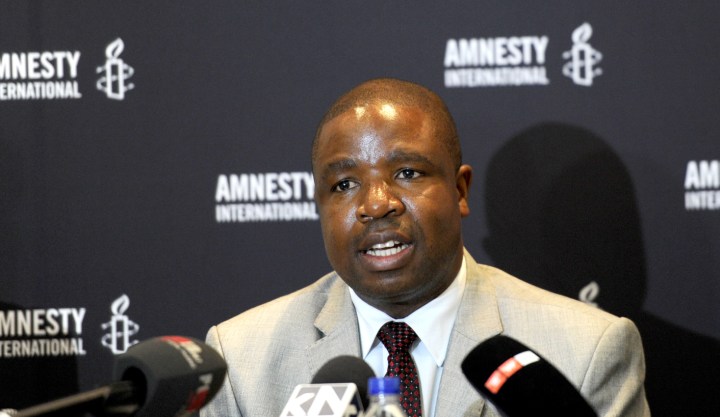World
Amnesty International: Not a good time for human rights

Amnesty International released its annual report on Wednesday, noting a pattern of abuse and force being used to crush dissent in Southern Africa. There were positives, but as 2015 has already seen a rise in the activity of armed groups and state force on the continent, the pattern is worrying. By GREG NICOLSON.
“On any given day I would usually say good morning but today I’ll just say ‘hello’,” said Amnesty International Southern Africa regional director, Deprose Muchena, at Constitutional Hill, as he introduced the global non-government organisation’s latest annual report. Muchena said the findings were “pretty grim”.
The report describes human rights abuses in 160 countries. A fact sheet lists some of the key numbers for 2014. In more than 20% of the countries studied, armed groups committed abuses. There were 18 war crimes or violations of the laws of war recorded in 18 countries. In 62 countries, prisoners of conscience had been jailed and in 82 of an investigated 131 countries, people had been tortured or ill-treated.
In South Africa, there is hope for improvement but rights abuses remain. Looking at how refugees and asylum seekers are treated, the report notes, “In the first four months of the year incidents in seven provinces led to the displacement of over 1,600 people. In June, sustained attacks in the Mamelodi area near Pretoria and the slow response of the police led to the looting or destruction of some 76 Somali-owned shops, large-scale displacements, the death of one refugee and injuries to 10 others. There was continuing concern at the failure of the government to protect the life and physical integrity of refugees and others in need of international protection”.
Amnesty’s local researcher, Mary Rayner, called for state leaders to proactively recognise the rights violations against refugees and migrants. She said there has been a “dismal repetition” of the attacks since the 2008 xenophobic violence, without the conviction of perpetrators. She noted that around the time of the World Cup in 2010 the police minister was engaged on the issue, which then helped avoid attacks.
Government has been criticised for failing to address the issue and for viewing it as criminality rather than xenophobia. In his State of the Province Address Monday, Gauteng premier David Makhura condemned attacks on foreign-owned stores and said South Africa should embrace the migrants, who should adhere to the law. Last week, President Jacob Zuma said the violence was tragic and unacceptable but a reminder to support local businesses and ensure criminals don’t exploit local frustrations.
The Amnesty report notes other issues in South Africa such as the Marikana Commission, women’s rights and the rights of lesbian, gay, bisexual, transgender and intersex groups. The organisation is concerned the Commission’s recommendations, to be finalised by the end of March, may not be implemented given the behaviour of some government officials during the inquiry in terms of withholding evidence.
The report is rife with allegations of torture and ill treatment committed by South Africa’s police. It says at least five people appear to have been murdered in 2013-2014 because of their sexual orientation or gender identity.
Amnesty notes HIV infection remains the highest cause of death during pregnancy and shortly after birth, at 40% of the total, with 60% of those deaths avoidable. A quarter of new HIV infections are in women aged 15 to 24 while girls under 18 accounts for 7.8% of live births but 36% of deaths.
Looking at Southern Africa, the Amnesty officials highlighted a pattern of abuse against those who espouse the freedoms of expression, association and assembly. Essentially, force is being used to crush dissent.
The report notes force used on peaceful demonstrators and unlawful killings of those challenging President Jose Eduardo dos Santos in Angola. Swaziland experienced ongoing violence, arrests and prosecutions against those advocating for human rights and political reform. Sexual minorities have been targeted in Zambia and thousands of people have been forcefully evicted from their homes in a number of countries.
Amnesty called on the Southern African Development Community (SADC) and African Union (AU), both under the leadership of Zimbabwe’s President Robert Mugabe, to acknowledge and help end the abuses.
But Mugabe’s Zimbabwe features with its own violations. Muchena said, “You don’t regularly see blood on the floor but that doesn’t mean the violence is over. What you see is ‘killing me softly’, if you want to be dramatic.” Amnesty deputy regional director Noel Kutuwa said Zimbabwe is a very sophisticated state and uses sophisticated methods of repression to punish those who stand against it, and, he added, the crisis has internalised within Zanu-PF while factions fight for power.
Amnesty listed a host of gains on the continent for human rights in the last year, but a rise in the activity of armed groups and elections in over a third of African counties, the report on 2015 could look even worse. DM
Photo: Deprose Muchena, Amnesty International’s director for the Southern Africa region speaks at a news conference held by the organisation in Johannesburg to highlight human rights abuse, Wednesday, 25 February 2015. Picture: Werner Beukes/SAPA


















 Become an Insider
Become an Insider